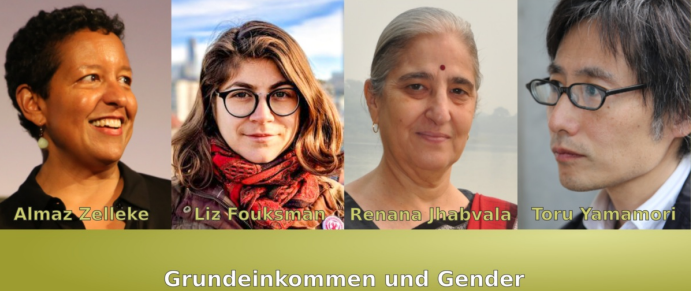
The Freiburg Institute for Basic Income Studies (FRIBIS), a network of several faculties at the University of Freiburg, has expanded with a new international team which focuses on basic income and gender issues, pulled together by Enno Schmidt. It uses as a starting point, the study by Prof. Toru Yamamori on the British women’s liberation movement in 1970’s, which was already calling for a UBI. According to Yamamori, grassroots feminist economic and political thought forms a basis of the demand for basic income, and the beginning of this can be seen during the women’s liberation movement in 1970’s Britain. For this reason, the relationship between grassroots feminist economic and political thought and basic income deserves to be re-examined, as this area has often been overlooked.
As a comprehensive research and design goal, the initiative seeks to examine grassroots feminist economic understanding and behavior and its potential in forming a new social contract with a particular focus on asic income. Based on this main principle, to amplify the voice of women in basic income research and design, the initiative seeks three objectives.. First, the further elaboration of Toru Yamamori’s study with final book publication, supported in particular by the collaboration of Barb Jacobson and Dr. Liz Fouksman in the UK. Secondly, a study and documentation on the question of women’s understanding of and behaviour in the economy and cooperation with members of the Self-Employed Women’s Association (SEWA) in India under guidance of Renana Jhabvala. This will be supplemented by similar empirical research by Liz Fouksman in South Africa and Prof. Dr. Kaori Katada in Japan and by the experiences, data and results of basic income projects in Canada by Chloe Halpenny. As a third goal, enriched by the outputs of the other 2 goals, the initiative aims to embed their relevance in a potential new social contract for real gender equality. This is planned to be introduced as a pilot project, in a yet to be determined region in the USA under the guidance of Prof. Dr. Almaz Zelleke and others to come. However, the team is also open to new influences and directions that arise during the collaboration, for example an additional focus on China.
For these purposes, the research programme will take place in 4 stages. The first phase will include a manifesto and presentations based on research which is already ongoing and which will start shortly. At this stage, the data, interviews and questionnaires of the participating researchers will be used. In the second phase, the focus will be on the collective reconstruction and articulation of “grassroots feminist economic and political thought”. At this stage, the experiences of relevant people in the research team will be used. In the third stage, the aim is to determine the positions of the above research in academic disciplines. In this sense, theoretical and anthropological studies will be carried out at this stage and the theoretical infrastructure of the outputs of the first two stages will be established. Based on the presentation and evaluation of the nature of women’s cooperation and work, and women’s perspectives on work and economy, this will significantly benefit from the experience of SEWA, and the Basic Income Pilot Projects for women in New Delhi and the 2009-10 pilot project in Madhya Pradesh. The fourth and final stage as envisaged so far, will include the implementation of UBI and new laws in a community in the USA.
In summary, the project aims to combine the introduction of a basic income and the creation of a new social contract from the point of view of women. The output that is intended to be reached at the end of the project is the draft of a new social contract. In other words, the main goal here is to present in a holistic way a draft programme for a society based on unconditional basic income, which is necessary to bring women to equal status with men.
The research team consists of Dr. Liz Fouksman, Chloe Halpenny, Prof. Dr. Kaori Katada, Prof. Dr. Toru Yamamori, Prof. Dr. Almaz Zelleke and as actors from social society Barb Jacobson and Renana Jhabvala. PhD student Jessika Schulz is organisational coordinator of the team on the part of FRIBIS.
Further information about the initiative and the project can be found at the following links:
https://www.fribis.uni-freiburg.de/en/project/ubig/
https://www.fribis.uni-freiburg.de/wp-content/uploads/2021/04/grassroot_feminist_economic_thought_paper.pdf
Endless thanks to Enno Schmidt for his valuable contribution to this article.
Serkan Simsir

